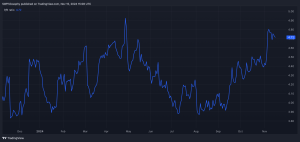ITV (LSE :ITV) shares are trading down almost 5% today (25 July) after it released interim results for the period ending June 30.
Despite a 2% decline in revenue down to £1.6bn, the broadcaster enjoyed a 40% increase in adjusted EBITA (Earnings Before Interest, Tax and Amortisation). CEO Carolyn McCall believes the company will also end the year with increased EBITA and is on track to meet 2026 key performance targets.
“This was driven by strong viewing across our broadcast channels and ITVX,” she said, citing the Euros 2024 and Love Island as favourites among viewers.
However, the group’s production arm, ITV Studios suffered a 13% decrease in revenue. This may have contributed to the drop today. The loss has been attributed to lingering effects from the 2023 writers’ and actors’ strikes, which delayed production schedules.
Profits before tax increased by 51% to £178m and the division is expected to deliver record profits over the full year. But the strikes are expected to deliver further losses amounting to around £80m. Revenue is expected to “be down low single digits” for the full year.
Looking ahead
Overall, ITV appears upbeat and positive about the results. But there has been little reaction from brokers. No rating changes have been put in place yet and no new short positions opened.
I don’t expect this morning’s dip to have a significant effect on the long-term price growth. The shares are up nearly 28% this year, having grown steadily since the FY23 results announced in early March. At that time, both ITV studios and ITVX delivered strong results, with the effects of the writer’s strike not yet evident.
Using a discounted cash flow model, analysts deem the shares to be undervalued by 65%. The price-to-earnings (P/E) ratio of 15.9 is in line with the industry average. And revenue and earnings are expected to grow — although not significantly.
The company continues to pay a consistent dividend, with a yield of 6%. Earnings per share (EPS), at 5.3p, are just enough to cover the 5p annual dividend. This makes it a fairly decent and reliable option for income investors.
What does the future hold?
In 2022, ITV was demoted from the FTSE 100 to the FTSE 250. The share price fell sharply (by 40%) in the following days. Investors fled and FTSE 100 tracker funds had to dump their stock, with the price eventually reaching a low of 53p later that year.
Since then, its fortunes have been mixed. It found its feet again and new investors began to warm to its prospects. The 2023 market slump cost it dearly but it’s recovered somewhat since.
Fierce competition and a rapidly changing media landscape continue to threaten its future. Its production arm is keeping it afloat and ITVX maintains a share of the online streaming market.
But to survive in the long run, I think it may need to enact more concrete changes.
I believe a complete rebranding and removal of ‘TV’ from the name would be beneficial. With more and more viewers consuming media via smart devices, this connection to the past may be lost on younger generations.
My shares have done well so far but I see challenges ahead for the broadcaster.
This post was originally published on Motley Fool







